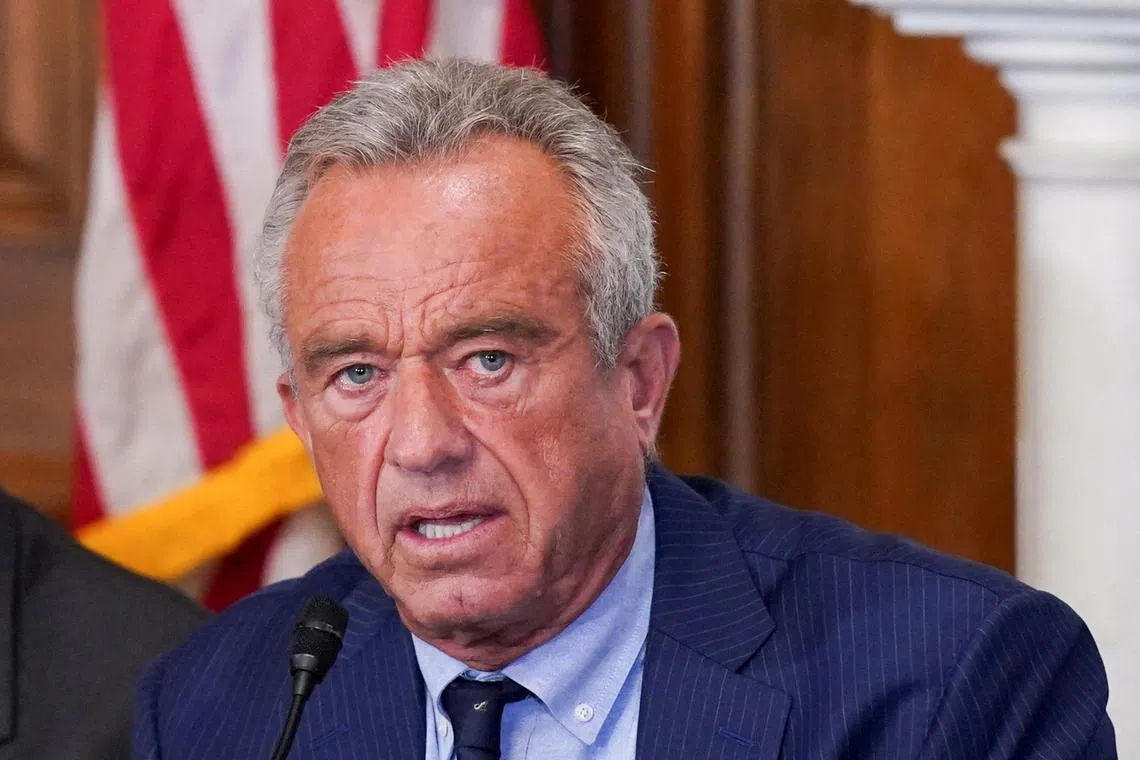US autism data project draws more than 100 research proposals: Sources
Sign up now: Get ST's newsletters delivered to your inbox

US Health Secretary Robert F. Kennedy Jr's assertion that the US is in the grip of an “autism epidemic” fuelled by “environmental toxins” has gained momentum.
PHOTO: REUTERS
Follow topic:
WASHINGTON – Researchers have submitted more than 100 proposals to participate in the Trump administration’s US$50 million (S$64.5 million) study into possible causes of autism, with a list of up to 25 grant winners expected to be announced by the end of September, people with knowledge of the plans told Reuters.
Health Secretary Robert F. Kennedy Jr announced the Autism Data Science Initiative
The programme aims to mine large datasets to investigate possible contributors to autism and evaluate the outcomes of existing treatments.
Studies chosen for funding might begin to show results in two to three years, according to the government’s request for research proposals.
The effort is proceeding separately from a review of vaccine safety commissioned by Mr Kennedy, who has long promoted the idea that vaccines contribute to autism, contrary to scientific evidence.
He has promised to announce health policy changes in September “that will dramatically impact the effects” related to autism, without providing details on the data that would support such changes.
A spokesperson for the Kennedy-led Department of Health and Human Services (HHS), which oversees NIH, said the agency is committed to addressing the rise in autism and will issue awards in September “pending receipt of scientifically meritorious ideas from the research community”.
They did not comment on any policy changes planned by Mr Kennedy.
Proposals for the NIH grant funding involve nearly 500 major universities and research institutions, advocacy organisations, and data firms, according to a list of applicants reviewed by Reuters.
Among the prominent names: Harvard University, Columbia University, Brigham and Women’s Hospital, Stanford University and Johns Hopkins University.
“I know many colleagues who applied for it because they weren’t sure there would be any other funding for autism research any time soon,” said Dr Helen Tager-Flusberg, director of Boston University’s Centre for Autism Research Excellence, adding they include many of the “most reputable scientists” in the field.
In August, the US Supreme Court allowed the Trump administration to proceed with sweeping cuts to NIH research funding, including some projects related to autism.
Some of the universities applying to the NIH autism programme have separately seen scientific funding cut by the Trump administration over their diversity policies or allegations of anti-Semitism on campus.
Dramatic rise
Mr Kennedy’s assertion that the US is in the grip of an “autism epidemic” fuelled by “environmental toxins” has gained momentum as US rates of the disorder have risen dramatically since 2000, to one in 31 children.
Decades of research has not yielded firm answers on what contributes to autism, but many scientists believe genetics, potentially in combination with environmental influences, play a role.
Experts say that autism cannot be described as an epidemic and that it may be due to a disruption in foetal development.
Many say that the rise in autism prevalence is due to an expanded definition of the disorder and increasing awareness and diagnosis.
Applicants to the Autism Data Science Initiative were asked to describe how they would use datasets to seek clues about the genetic and non-genetic contributors to autism and to identify patterns associated with interventions and other services provided to people with the condition.
“The very large increase in autism prevalence that we’ve seen over the past 25 years leads to an obvious question: What is behind this increase?” Dr Cindy Lawler, chief of genes, environment and health branch at the National Institute for Environmental Health Sciences, said during a June webinar about the new funding initiative.
She added that environmental chemical exposures, parental or lifestyle factors, such as nutrition, pharmaceuticals, obesity, or birth factors, such as prematurity, could be areas of interest.
A large team at Case Western Reserve University submitted a proposal, currently under review, to analyse patient health records to search for common factors that may lead to autism.
Dr David Kaelber, professor of paediatrics and population quantitative health sciences at the university, emphasised the importance of using real-world data to address questions about autism, including potential links to vaccines and environmental factors.
Harvard, Columbia, Brigham, Stanford and Johns Hopkins did not respond to Reuters requests for comment.
Each project will undergo independent replication to help verify the reliability and reproducibility of new analyses, according to NIH’s proposal.
One applicant, who submitted a proposal to study prenatal exposures that may cause autism, said he was impressed with the requirements to share data with a trusted partner for replication.
The applicant, who spoke anonymously to prevent jeopardising the application under consideration, said he “hoped that all HHS-sponsored autism studies would be subject to the same scrutiny.” REUTERS

